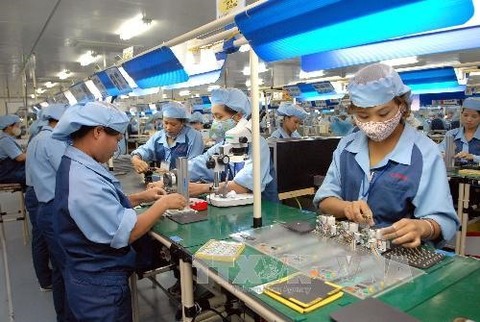
Deputy Prime Minister Trinh Dinh Dung has recently issued the working regulations of the Steering Committee for Viet Nam’s Industrialisation Strategy within the Viet Nam – Japan co-operation framework until 2020 with a vision to 2030.— VNA/VNS Photo Danh Lam
Deputy Prime Minister Trinh Dinh Dung has recently issued the working regulations of the Steering Committee for Viet Nam’s Industrialisation Strategy within the Viet Nam – Japan co-operation framework until 2020 with a vision to 2030.
The steering committee is responsible for assisting the Prime Minister in research and directing, coordinating and implementing strategy.
It will support the Government leader in setting out plans for inter-sectoral coordination.
The steering committee will also report to the PM any problems as well as ask the leader to consider and devise solutions to those issues.
Priority will be given to six key industries, which have high-value and international competition capacity, including automobile and auto spare parts, farming machines, agro-fishery product processing, shipbuilding, electronics, environmental industry and energy saving.
The strategy is expected to attract investment and increase the efficiency of foreign direct investment, particularly from Japan.
It will create and consolidate production links between Japanese enterprises and domestic companies, promote technology transfer and innovation and improve the quality of human resources in Viet Nam.
By 2020, these sectors will lead the way in applying high technology and clean technology with the production value increase of at least 20 per cent annually, contributing at least 35 per cent to the total production value of the industry.
The committee will help the PM direct coordination among ministries and sectors in building and guiding the implementation of prioritised industrial development mechanisms and policies, as well as urge ministries and sectors and People’s Committees provinces and centrally-run cities to effectively carry it out.
The committee is made up of members of the Party Central Committee’s Economic Commission, the State Bank of Viet Nam, the Government office, and the Ministries of Foreign Affairs; Information and Communications; Finance; Industry and Trade; Agricultural and Rural Development; Transport; Science and Technology; Education and Training; and Labour Invalids and Social Affairs.
The Japanese Ambassador to Vietnam (or a representative of the Japanese Embassy in Viet Nam) and those from the Japan Business Association in Viet Nam will be invited to join the committee. — VNS